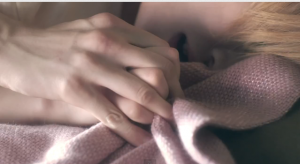 It’s been long enough. The coast is clear. At this point, it’s quite evident that MOGEF, otherwise known as Korea’s Ministry of Gender Equality and Family, will not be stamping Hyuna’s “Ice Cream” MV with an age restriction label which would have possibly banned it from Korean airwaves until the late hours of the night. The executives at Cube Entertainment may finally breathe a heavy sigh of relief as they’ve snuck yet another one past MOGEF.
It’s been long enough. The coast is clear. At this point, it’s quite evident that MOGEF, otherwise known as Korea’s Ministry of Gender Equality and Family, will not be stamping Hyuna’s “Ice Cream” MV with an age restriction label which would have possibly banned it from Korean airwaves until the late hours of the night. The executives at Cube Entertainment may finally breathe a heavy sigh of relief as they’ve snuck yet another one past MOGEF.
Over the past few weeks, there has been quite a bit of discussion comparing the portrayal of female sexuality in the MVs for Ga-in’s “Bloom” and Hyuna’s “Ice Cream.” Seoulbeats writer, Dana, rightfully gives Ga-in’s MV a ton of credit for depicting a woman’s discovery of her sexuality from a female perspective. Despite the video’s classy and realistic portrayal of female sexuality, MOGEF has put a 19+ label on “Bloom,” citing the racy sex scenes that appear toward the climax (pun intended) of the video. In contrast, Hyuna is literally and figuratively being displayed as man snacks in her recent release, complete with raunchy dancing, provocative poses, and shallow sexual insinuations, yet her MV gets nothing but a stamp of approval from MOGEF. Why does Hyuna get a pass but not Ga-in? In order to answer this question, we must examine the relationship between censorship and the media.

Fact 1 — Media, particularly the mainstream media, is run by corporations. A corporation’s primary motive is to make money. In order to make money, they must sell things. The best way to sell things is to market to people through television, music, etc.
Fact 2 — Sex sells. Sex is a great marketing tool because it has this magical effect of drawing people’s attention and inspiring feelings of joy. Corporations want their name and product to be associated with these feelings of joy. Nevertheless, there are limitations as to what they can broadcast. That’s where MOGEF comes in.
Fact 3 — MOGEF does not permit direct portrayals of sex. Sex is a sensitive subject and media must avoid its direct association to refrain from controversy. Therefore, corporations are required to sell sex in a more subtle manner. Instead of portraying the actual act of intercourse, media fulfills the consumer’s desire for sex through the depiction of the hyper real: sexual fantasies, fetishes, and innuendos. Through cleverly disguising sex as a form of artistic imagery, cosplay, and wordplay, corporations have had their methods in smuggling sex to the consumer in ways that are becoming less and less subtle.
It’s impossible to contextualize the relationship between censorship and the media without bringing into account the male gaze. The male gaze is the media’s inclination to portray women in a way that is in servitude to the physical and behavioral likings of men, even at the most awkward disposition to the woman. The male gaze is a sly marketing tool which subverts the restrictions of MOGEF through submerging sexual implications which reinforce a hierarchical gender structure. Men find sex more pleasing if it is directed towards their needs and the male gaze is designed to cater mostly to the sexual desires of men. In essence, the male gaze is a way to swindle men’s pockets through advertising what appeals to their most primal need, sex.
 While Hyuna’s camp caters directly to the male gaze, they do so very deliberately because they care very much about the general marketability of their MV. They’ve already been censored twice byMOGEF with Hyuna’s first two releases, “Change” and “Bubble Pop,” both having been banned for her provocative dancing, in particular her excessive gyration movements in the lower hip region. They barely escaped with “Troublemaker,” electing to draw attention away from Hyuna’s pelvis and more towards the wandering hands of Hyuna’s dance partner. It’s quite clear that Cube is by now very much aware of the things that will generate the disapproval of MOGEF and are trying their best to work around it. Despite its 19+ rating, “Bubble Pop” became an international sensation due to its online popularity. “Ice Cream” is racking up its YouTube view count at a more rapid pace because not only does it have the international appeal, but this time around it also has the added support and blessing of domestic viewers, all thanks to MOGEF.
While Hyuna’s camp caters directly to the male gaze, they do so very deliberately because they care very much about the general marketability of their MV. They’ve already been censored twice byMOGEF with Hyuna’s first two releases, “Change” and “Bubble Pop,” both having been banned for her provocative dancing, in particular her excessive gyration movements in the lower hip region. They barely escaped with “Troublemaker,” electing to draw attention away from Hyuna’s pelvis and more towards the wandering hands of Hyuna’s dance partner. It’s quite clear that Cube is by now very much aware of the things that will generate the disapproval of MOGEF and are trying their best to work around it. Despite its 19+ rating, “Bubble Pop” became an international sensation due to its online popularity. “Ice Cream” is racking up its YouTube view count at a more rapid pace because not only does it have the international appeal, but this time around it also has the added support and blessing of domestic viewers, all thanks to MOGEF.
 For those who find it quite mind-boggling that “Ice Cream” is considered kosher mainstream material as opposed to “Bloom” being not, consider the following paradigm. It’s almost hilarious how close “Ice Cream” comes to perfecting the male gaze through its imitation of the medium which most caters to men’s sexual desires, pornography. Firstly, the MV’s cinematography is very reminiscent of pornography. As mentioned before on this site, MVs for female artists are beginning to indulge in camera work popularized by soft-core porn, which puts the viewer’s perspective closer to ground level, providing them with an unrestricted view of the female performer’s gorgeous body. Such a technique was also deployed in “Bubble Pop.” Secondly, there are parts of the choreography which allude to sexual acts. In one sequence, Hyuna is literally riding a guy, albeit on his back, as she bounces up and down on top of her back-up dancer. In another, she is spraying the crowd with whipped cream (let’s not even go into what that is referring to). Thirdly, the ice cream metaphor is an example of double entendre wordplay which is purposely deployed so that male libidos may subconsciously interpret it as a reference to different forms of kinky oral foreplay. With “Ice Cream,” Cube is literally mocking MOGEF with so many crude displays of indirect sexual references and imitations of pornography. Meanwhile, MOGEF turns a blind eye, allowing them to get away with it. In the end, Hyuna’s MV escapes the grips of MOGEF largely because it isn’t a direct depiction of sex, and because it conforms to the parameters of the male gaze through its fulfillment of a man’s sexual desires.
For those who find it quite mind-boggling that “Ice Cream” is considered kosher mainstream material as opposed to “Bloom” being not, consider the following paradigm. It’s almost hilarious how close “Ice Cream” comes to perfecting the male gaze through its imitation of the medium which most caters to men’s sexual desires, pornography. Firstly, the MV’s cinematography is very reminiscent of pornography. As mentioned before on this site, MVs for female artists are beginning to indulge in camera work popularized by soft-core porn, which puts the viewer’s perspective closer to ground level, providing them with an unrestricted view of the female performer’s gorgeous body. Such a technique was also deployed in “Bubble Pop.” Secondly, there are parts of the choreography which allude to sexual acts. In one sequence, Hyuna is literally riding a guy, albeit on his back, as she bounces up and down on top of her back-up dancer. In another, she is spraying the crowd with whipped cream (let’s not even go into what that is referring to). Thirdly, the ice cream metaphor is an example of double entendre wordplay which is purposely deployed so that male libidos may subconsciously interpret it as a reference to different forms of kinky oral foreplay. With “Ice Cream,” Cube is literally mocking MOGEF with so many crude displays of indirect sexual references and imitations of pornography. Meanwhile, MOGEF turns a blind eye, allowing them to get away with it. In the end, Hyuna’s MV escapes the grips of MOGEF largely because it isn’t a direct depiction of sex, and because it conforms to the parameters of the male gaze through its fulfillment of a man’s sexual desires.
 The difference between Ga-in and Hyuna is that Ga-in’s depiction of sex is in direct defiance of the male gaze. Her image is independent of MOGEF’s standards because she chooses to not play by their rules. She is not new to hair-raising, eye-popping MVs through her work as a member of Brown Eyed Girls. In fact, a lot of their work plays up to the 19+ rating, testing the limits of MOGEF: risque sexual depictions in “Abracadabra,” mature social themes in “Cleansing Cream,” and even a jab at the media’s entrapment of women in “Sixth Sense.” The MV for “Bloom” again draws much attention for its raw portrayal of sex. Although not uncommon to Korean cinema, a depiction of female sexual discovery is highly unprecedented in their music industry. Unlike Korea’s art house films marketed towards adult viewers, and where sex and nudity run rampant, K-pop is marketed towards adolescents and teens who are apparently not meant to be exposed to such mature material at such a ripe age. Ga-in is reaching an age where she is no longer trying to connect with a younger crowd, but instead chooses to appeal to a more mature audience. Although the 19+ rating puts a damper on her material as being inappropriate for mainstream consumption, the age restriction on her lead single will perhaps boost her reputation as an artist who is willing to push the envelope for the sake of pioneering a more mature and feministic music industry.
The difference between Ga-in and Hyuna is that Ga-in’s depiction of sex is in direct defiance of the male gaze. Her image is independent of MOGEF’s standards because she chooses to not play by their rules. She is not new to hair-raising, eye-popping MVs through her work as a member of Brown Eyed Girls. In fact, a lot of their work plays up to the 19+ rating, testing the limits of MOGEF: risque sexual depictions in “Abracadabra,” mature social themes in “Cleansing Cream,” and even a jab at the media’s entrapment of women in “Sixth Sense.” The MV for “Bloom” again draws much attention for its raw portrayal of sex. Although not uncommon to Korean cinema, a depiction of female sexual discovery is highly unprecedented in their music industry. Unlike Korea’s art house films marketed towards adult viewers, and where sex and nudity run rampant, K-pop is marketed towards adolescents and teens who are apparently not meant to be exposed to such mature material at such a ripe age. Ga-in is reaching an age where she is no longer trying to connect with a younger crowd, but instead chooses to appeal to a more mature audience. Although the 19+ rating puts a damper on her material as being inappropriate for mainstream consumption, the age restriction on her lead single will perhaps boost her reputation as an artist who is willing to push the envelope for the sake of pioneering a more mature and feministic music industry.
Ga-in’s MV is an honest and sensible portrayal of female sexuality, and is banned from daytime airwaves because it is such. The metaphor of a flower blooming as compared to a woman’s sexual coming-of-age is powerful, intricate, and beautiful. While the sex scenes are steamy and captivating, they aren’t meant for the male gaze. Instead, they clearly depict the sexual enjoyment of the woman as opposed to portraying her as a visual delight of men. For this realistic and artistic portrayal of sex, MOGEF swiftly deems it inappropriate for the nation’s youth while the exploitative, hyper-sexualized depictions of a much younger Hyuna are considered fitting.
 A parallel example can be found in the US film industry. The critically acclaimed Boys Don’t Cry was originally given an NC-17 rating by the Motion Picture Association of America (MPAA), meaning that no one at or under the age of 17 would have been admitted to seeing the film in its theatrical release, though in this case the director was allowed to edit the film to resubmit for rating. As revealed in the documentary This Film is Not Yet Rated, the director of the film was notified by the MPAA of what footage espoused the NC-17 rating, and among them was an intense scene that focuses on actress Chloe Sevigny’s face while she is experiencing an orgasm. Such a portrayal of female sexual enjoyment, in contrast to Hollywood love scenes which also typically cater to the viewing pleasure of men, was believed to be the reason that censors initially chose to designate the film with an unmarketable rating. The same principle applies to K-pop in that censorship tends to lean more in favor of depicting sex in line with what is the norm, which is dictated by the media’s steady and unapologetic dosage of the male gaze.
A parallel example can be found in the US film industry. The critically acclaimed Boys Don’t Cry was originally given an NC-17 rating by the Motion Picture Association of America (MPAA), meaning that no one at or under the age of 17 would have been admitted to seeing the film in its theatrical release, though in this case the director was allowed to edit the film to resubmit for rating. As revealed in the documentary This Film is Not Yet Rated, the director of the film was notified by the MPAA of what footage espoused the NC-17 rating, and among them was an intense scene that focuses on actress Chloe Sevigny’s face while she is experiencing an orgasm. Such a portrayal of female sexual enjoyment, in contrast to Hollywood love scenes which also typically cater to the viewing pleasure of men, was believed to be the reason that censors initially chose to designate the film with an unmarketable rating. The same principle applies to K-pop in that censorship tends to lean more in favor of depicting sex in line with what is the norm, which is dictated by the media’s steady and unapologetic dosage of the male gaze.
 Before I conclude, it’s important to not disregard the fact that the same marketing formula also applies for women. Men are objectified in the media to meet the female gaze and to bring about feelings that women crave. Nevertheless, MOGEF’s standards towards prohibiting the work of men is much more lax in that male artists are allowed to get away with much more than do female artists. Take for example Teen Top’s “No More Perfume on You” in which they sing about cheating on their girlfriend with an older woman. Aside from that, the MV is filled with plenty of politically incorrect scenarios in which the folks at Eat Your Kimchi painstakingly point out. Their hilarious skit of the nonsensical MOGEF officials (beginning at 4:20) is well worth checking out:
Before I conclude, it’s important to not disregard the fact that the same marketing formula also applies for women. Men are objectified in the media to meet the female gaze and to bring about feelings that women crave. Nevertheless, MOGEF’s standards towards prohibiting the work of men is much more lax in that male artists are allowed to get away with much more than do female artists. Take for example Teen Top’s “No More Perfume on You” in which they sing about cheating on their girlfriend with an older woman. Aside from that, the MV is filled with plenty of politically incorrect scenarios in which the folks at Eat Your Kimchi painstakingly point out. Their hilarious skit of the nonsensical MOGEF officials (beginning at 4:20) is well worth checking out:
B1A4 is another example of a male group who went with the theme of infidelity in their MV for “Baby, Good Night” and came out completely unscathed. It seems that for male artists, as long as they don’t use inappropriate slang, cursing, or mention alcohol consumption in their songs, they can literally get away with singing about murder. And now, with MOGEF’s decision to revoke its bans on Psy’s “Right Now” and 2PM’s “Hands Up” largely due to their international popularity, male artists may get away with even more.
 Connecting back to the original issue of why Ga-in’s MV is banned and not Hyuna’s, MOGEF has had a very blatant track record of perpetuating double standards. Sex is sex whether it’s in a direct or indirect form but the prevalence of the male gaze in mass media has desensitized the censors at MOGEF from seeing the real implications behind Hyuna’s “Ice Cream.” At the same time, they are unhesitant in condemning Ga-in’s “Bloom” because of its unwillingness to mask its potent message behind the illusion of the male gaze. Moreover, MOGEF’s blind eye towards the exploits of male artists further puts into the question the motives which influence their decision making.
Connecting back to the original issue of why Ga-in’s MV is banned and not Hyuna’s, MOGEF has had a very blatant track record of perpetuating double standards. Sex is sex whether it’s in a direct or indirect form but the prevalence of the male gaze in mass media has desensitized the censors at MOGEF from seeing the real implications behind Hyuna’s “Ice Cream.” At the same time, they are unhesitant in condemning Ga-in’s “Bloom” because of its unwillingness to mask its potent message behind the illusion of the male gaze. Moreover, MOGEF’s blind eye towards the exploits of male artists further puts into the question the motives which influence their decision making.
While I definitely agree with the notion that we should look at this issue beyond who receives more or less slut-shaming, I also believe that the dichotomy between a patriarchic and a feministic perspective on female sexualization should not be ignored. Ga-in’s revealing portrait of a woman’s sexual revelation is a much more positive and healthy image when compared to the unrealistic, self-deprecating, male-catering caricature of Hyuna. It’s rather ironic that the entity reinforcing such a traditional chauvinistic depiction of women in media bares the words “gender equality” in its name. MOGEF’s double standards have led to greater inequality among the genders, so therefore it would be seemingly more appropriate if they were to be renamed the Ministry of Gender Inequality and Family, MOGIF.
On a recent episode of variety talk show Strong Heart, Ga-in expressed her puzzlement over MOGIF’s “deliberate” attempts at censoring the music of her and her band mates for arbitrary and unfair reasons. May her perplexity as well as many of ours be slightly absolved, but definitely unresolved, by understanding MOGIF’s frame of mind when it comes to assessing the works of female artists.
With that being said, am I not the only one who has had it with the inconsistent, demeaning, and at times nonsensical actions of MOGIF? Please leave your comments below.
(This Film is Not Yet Rated, simonandmartina, Naver, Daum, Loen Entertainment, Cube Entertainment, TS Entertainment)


